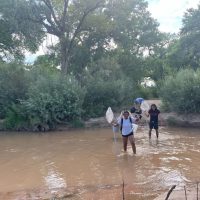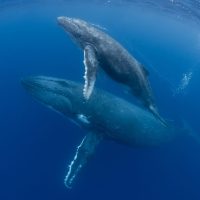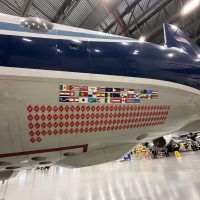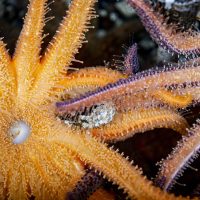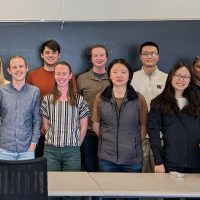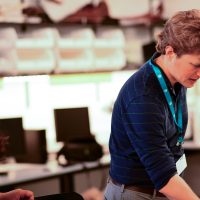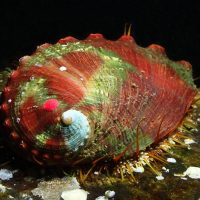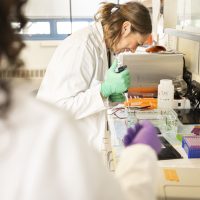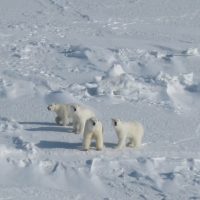Filter Results
Summer research on the Rio Grande
During the summer of 2025, members of the Wood Lab travelled to Albuquerque, New Mexico to work with Drs.Tom Turner and Sara Brant from University of New Mexico Museum of Southwestern Biology to quantify the change in parasite abundance and diversity in the Rio Grande over the past 72 years, a period stretching from 1938 to 2010.
Read moreLonger body size means more female calves for baleen whale moms
Long baleen whale mothers are more likely to have female calves than males, according to a new study led by the University of Washington. The findings, published by UW QERM student Zoe Rand and Professors Trevor Branch and Sarah Converse, contradict a popular evolutionary theory postulating that strong mammals benefit more from birthing males.
Read moreInspired by her mother and the mountains: Aashna Sharma writes for Science
Fullbright Scholar, Science contributor, freshwater biologist. These are some of the ways to describe Aashna Sharma, who is currently working with Dr. Julian Olden at SAFS as part of her two-year postdoctoral fellowship. From the foothills of the Himalayas in India, Aashna was recently inspired by the Past as Prologue feature in Science that highlights how different scientists from around the world are shaped by their family and background, and submitted a piece herself.
Read moreScience from the air: NOAA Hollings internship with the Hurricane Hunters
Last year, we spoke with SAFS undergrad, Michael Han, about receiving the NOAA Hollings Scholarship and where this would take him over the next year. This summer, Michael has split his time between NOAA’s HQ in Silver Spring, Maryland and NOAA’s Aircraft Operations Center (AOC) in Lakeland, Florida. His internship has been focused on NOAA’s Hurricane Hunters, aircraft which fly into the world’s worst weather to collect data which assists forecasters in making accurate predictions during hurricanes, and helps hurricane researchers achieve a better understanding of storm processes.
Read moreDiscovery of the decade reveals the culprit behind sea star wasting disease
Until now, no one knew what caused the sea star wasting disease which wiped out populations along the West Coast starting in 2013. But an international research effort including scientists from the University of Washington has finally revealed the cause: a strain of the bacterium Vibrio pectenicida.
Read moreClimate change and communication go hand-in-hand for PNW Climate Ambassadors
We’re living in a digital age, where the ability to find information (or even at times misinformation) is instant wherever you are in the world. This comes at the same time we’re at a critical juncture for climate research, where studying our changing world is more important now than ever. For SAFS graduate student, Amirah Casey, she knows that communication is vital to make impactful changes, and so applying for the PNW Climate Ambassadors program was a no-brainer.
Read moreEvidence-based program helps students see themselves as scientists
Jose Guzmán wanted to help bridge the gaps that undergraduates faced in participating in research, and that graduate students faced in mentoring. And so, the IBIS program was born.
Read moreRaising the next generation of endangered pinto abalone
A new study, led by recently-graduated doctoral student Eileen Bates and principal investigator Jacqueline Padilla-Gamiño, and funded by Washington Sea Grant, found climate change stressors negatively impact pinto abalone during their larval stage.
Read moreGenetic metabarcoding to study marine mammals
Working with Assistant Professor Amy Van Cise in the Whale and Dolphin Ecology Lab, Arial Brewer (PhD, SAFS) and Mollie Ball (BS, Marine Biology) were preparing metabarcoding libraries to study marine mammals. This means barcoding DNA (or eDNA) in a manner that allows for the simultaneous identification of many taxa within the same sample.
Read moreA sweet surprise: Polar bear glucose reveals new insights into their reproduction and conservation
Each year, polar bears cycle through periods of intense feasting and prolonged fasting. For reproductive females, seasonal bulking is crucial – it fuels the winter denning and fasting period when they give birth. And when they emerge in spring, it gives biologists a chance to assess populations. A new study led by Sarah Teman explores whether A1c could reveal if a polar bear had recently denned, which – combined with the absence of cubs – may signal reproductive failure.
Read more